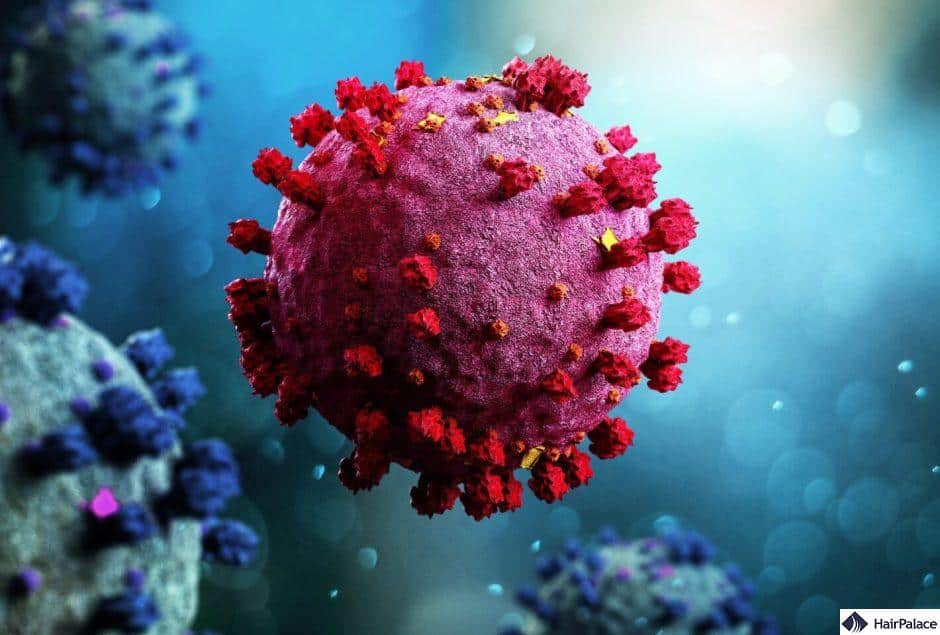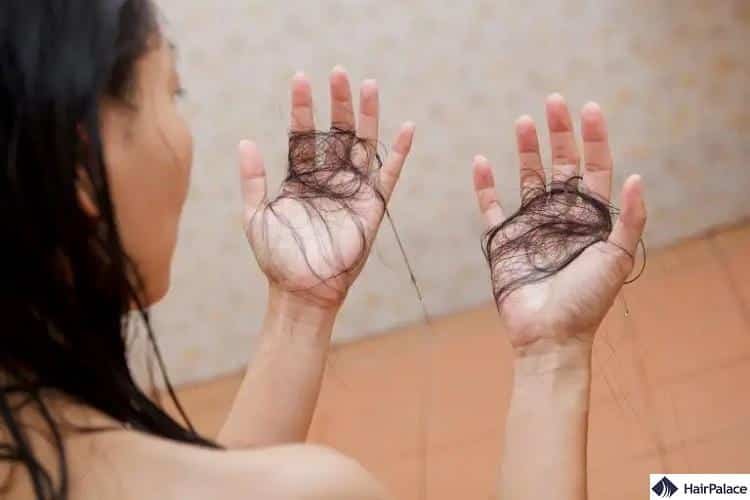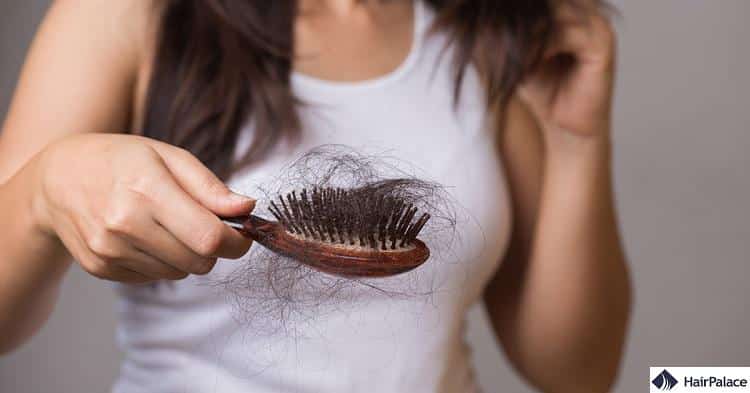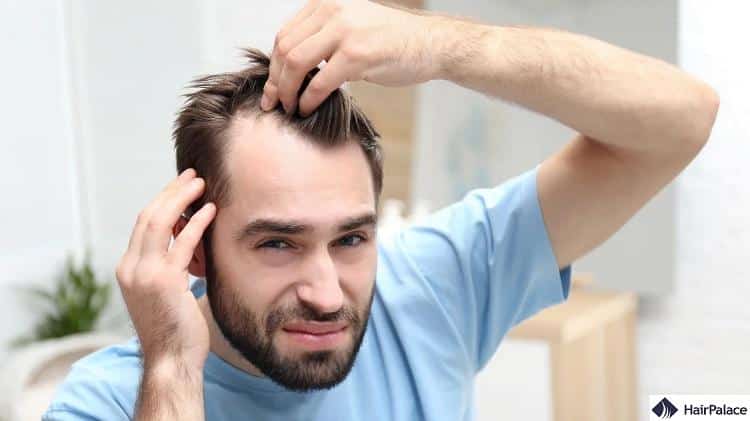Covid Hair Loss: Why It Happens And How to Treat It

- How does COVID cause hair loss?
- What does it look like?
- Will it grow back?
- How to treat COVID hair loss?
Covid-19 can cause a variety of side effects and has a diverse list of symptoms. Among these potential side effects is Covid-19 hair loss.
There are many aspects of Covid-19 that we’re yet to fully understand, but researchers are finding out more and more about the virus with each passing day.
We now not only know for certain that Covid-19 does indeed cause hair loss, but we’re also starting to understand the reasons behind the phenomenon.
So let’s explore the relationship between Covid-19 and hair thinning, as well as your options to treat this type of diffuse hair loss.

Covid and hair loss
The type of hair loss caused by COVID is referred to as Telogen effluvium(TE), which causes sudden and noticeable hair shedding as a result of outside stress.
The stress responsible for TE can be physical or emotional, this condition is also responsible for the hair loss that occurs in women after giving birth. (Although in this case, the hair shedding is also related to hormonal changes in your immune system.)
Unlike other illnesses, SARS-COV-2 creates a slightly unique situation, as not only does the virus cause physical stress to your body, but contracting it also puts you under severe mental anxiety.
About telogen effluvium
Approximately 90% of our hair is in what’s called the growing or anagen phase. While about 10% of our hair is in what’s called the telogen or resting and shedding phase.
The anagen phase usually lasts for about 3 years, while telogen can last anywhere from 2 to 6 months. At the end of the latter, hairs begin to shed and get replaced by new hairs during the anagen phase.
The average person sheds about 100 to 150 hairs each day.
However, an event that causes excess stress to your body (such as Covid-19) may alter your hair growth lifecycle. This can cause your body to prematurely transition an unusual amount of hair follicles into the resting telogen phase.
So instead of the usual 10%, the hairs that are in the resting and shedding phase rise up to about 50% .
This leads to more hairs falling out than the anagen phase can naturally reproduce.

Does everyone experience hair shedding after covid?
According to a 2020 study, around 1 out of 10 people experience hair loss after covid. Although some other studies suggest that hair shedding occurs for nearly 66% of post covid patients.
It’s not clear whether hair loss after Covid-19 infection correlates with any common symptom of the virus or the severity of each case.
Research is still ongoing, but so far nobody has been able to find a clear relationship. Some patients report noticeable hair shedding after a mild case of covid, while others experience almost no shedding at all after a severe illness.
What does Covid hair loss look like?
You can get a better idea about the condition by looking at covid hair loss pictures. However, covid hair loss is characterized by a couple of distinct symptoms:
1. Increased hair loss
Patients reporting hair loss after Covid-19 usually notice large clumps of hair falling out during their daily hair care routine.
Most people tend to notice an increased amount of hair shedding after washing or combing their hair, which leads to noticeable hair thinning. Some patients also mention itchy scalp and hair loss after covid, which is often among the first signs.
2. Hair shedding occurs around 3 months post-covid
TE usually appears with a 3-month delay after the triggering event. So you may have already recovered from your initial infection, and then a few weeks later the hair shedding starts.
3. You notice a sudden loss of hair density
Telogen effluvium usually occurs in the form of excessive hair shedding, so instead of losing the normal 100 to 150 hairs each day, you’re suddenly losing far more hairs.
People typically notice that their hair is not at its normal fullness anymore when they see large amounts of hair in their shower drain, brush, or comb.

4. It affects the whole scalp
TE doesn’t cause subtle hair loss or slight hair shedding such as early androgenetic alopecia(genetic hair loss). Acute telogen effluvium comes with sudden shedding that leaves your scalp hair looking thin and sparse.
Hair loss after Covid: Will it grow back?

The good news is that most of the time telogen effluvium only causes temporary hair loss.
Hair grows back within six to nine months once the excess telogen hairs have been shed.
As soon as the triggering event gets resolved your hair will start to slowly return back to normal.
The reason why hair loss caused by TE usually resolves on its own is that it doesn’t actually damage any hair follicles, it simply prevents them from entering the growth phase and forces them to stay in the resting phase for longer than they should.
However, even after the excessive hair shedding stops, patients may notice their hair is thinner than it used to be.
This is because of the slow nature of natural hair regrowth, as your hair only grows about one centimeter each month. If you have long hair, it can take up to 2 or 3 years before your hair regains its former look.
One out of ten patients may experience a more severe form of TE called chronic telogen effluvium. This is where hair shedding persists beyond the normal six to nine months.
This condition can last anywhere from a couple of months to several years.
Chronic TE usually occurs in patients who suffered from Covid-19 illness for a prolonged period of time.
This is most likely due to the several weeks of intense stress that their bodies were under due to the illness.
The only reassuring fact for patients suffering from chronic TE is that most people only lose about 50% of their hair at worst.

Post covid hair loss remedy: What’s the best treatment for hair loss after covid?
Hair loss due to covid can be an emotionally draining process, but the most important thing is patience.
Covid-19-related hair loss is different than other types of hair loss such as alopecia areata, or androgenic alopecia as it almost never leads to complete baldness.
As covid hair loss is only temporary, the best treatment is to simply wait.
Although there are a few home remedies for hair loss after covid that you should keep in mind in order to shield your hair from unnecessary damage:
- You should avoid using devices that expose your hair to excess heat, such as hair straighteners or curling irons.
- Avoiding chemicals and tight hairstyles is also essential to minimize the risk of losing more hair.
- Consider getting tested for nutritional deficiencies, as lacking certain vitamins and minerals can contribute to hair loss.
The best vitamins for hair loss after covid include: Iron, vitamin D, vitamin B12, and zinc are all essential in maintaining a healthy head of hair.
If it turns out that you are suffering from some form of nutritional deficiency, you should consult with a doctor. They will be able to work out how you can get your vitamin levels back to normal. - Lowering the amount of stress you’re exposed to can also help.
Practicing meditation or breathing exercises can be helpful in regaining normal hair function. If you feel like you’re not able to lower your stress levels on your own, consider talking to a therapist.
Try out products or treatments that promote hair growth, such as:
- Hair growth products
- Scalp massages
- Laser therapy
- PRP therapy
- Minoxidil
With all that being said, if you still experience noticeable hair shedding you should consult with a board-certified dermatologist.
If you’re not able to find a specialist, see your local GP who will refer you to one.
Although chronic TE is possible, it is highly uncommon. Scientists still don’t fully understand what exactly causes the condition, but less than 10% of TE patients develop chronic telogen effluvium.
In conclusion, the link between Covid-19 infection and dermatological issues affecting the skin or body is still unclear. However, most people only experience temporary hair loss from TE, which gets resolved on its own after a couple of months.
FAQ
COVID-19-related hair loss, often a form of telogen effluvium, typically lasts for 6 to 9 months. This type of hair loss is usually temporary, and the hair often begins to regrow on its own after this period.
To recover from hair loss after COVID-19, focus on maintaining a healthy diet rich in vitamins and minerals, managing stress through relaxation techniques or exercise, and ensuring proper hair care to avoid further damage. Over time, hair usually regrows on its own. If hair loss persists, consulting a healthcare provider for targeted treatments or supplements might be necessary.
Last medically reviewed on April 24th, 2024
- Popescu, Marius Nicolae et al. “Complementary Strategies to Promote Hair Regrowth in Post-COVID-19 Telogen Effluvium.” Clinical, cosmetic and investigational dermatology vol. 15 735-743. 22 Apr. 2022https://www.ncbi.nlm.nih.gov/pmc/articles/PMC9042074/
- Olds H, Liu J, Luk K, Lim HW, Ozog D, Rambhatla PV. Telogen effluvium associated with COVID-19 infection. Dermatol Ther. 2021 Mar;34(2):e14761.https://pubmed.ncbi.nlm.nih.gov/33405302/
- Abrantes TF, Artounian KA, Falsey R et al. Time of onset and duration of post-COVID-19 acute telogen effluvium. J Am Acad Dermatol. 2021 Oct;85(4):975-976.https://pubmed.ncbi.nlm.nih.gov/34302903/
- Czech T, Sugihara S, Nishimura Y. Characteristics of hair loss after COVID‐19: A systematic scoping review. Journal of Cosmetic Dermatology. 2022 Sep;21(9):3655-62.https://doi.org/10.1111/jocd.15218
- Mieczkowska, Karolina et al. “Telogen effluvium: a sequela of COVID-19.” International journal of dermatology vol. 60,1 (2021): 122-124.https://doi.org/10.1016/j.jaad.2021.07.021



